Gidget (1959)
“When it’s the real thing, you’ll know it — as surely as if you’d been hit on the head with a sledgehammer!”
|
Synopsis: |
|
Genres, Themes, Actors, and Directors:
Review: The mocking disdain shown when Gidget first attempts to enter the surfing clique’s hallowed turf rings all-too-true and painful; it’s especially disturbing to see “Lover Boy” (Tom Laughlin) being sexually aggressive with innocent young Gidget while purportedly teaching her how to surf (thankfully, she holds her own just fine). Where the film falters a bit is in the casting of teen heartthrob James Darren as Moondoggie, the object of Gidget’s affections. He’s such a pill that we can’t help wondering why she persists in her crush (though of course, the heart knows no reason, and I suppose he’s good-looking enough in his way). Much more interesting, however, is the relatively complex role played by Robertson, whose character “The Big Kahuna” possesses an intriguing history as a Korean War vet; one wishes his storyline were given a bit more emphasis. Then again, this film really is all about Gidget herself — and Dee is appropriately winsome in this central role.
Note: Residents of Southern California will enjoy laughing themselves silly at the notion that Robertson could successfully set up and maintain a ramshackle home for himself right on the beach. Ha! Redeeming Qualities and Moments: Must See? Links: |
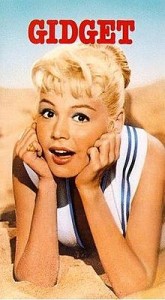

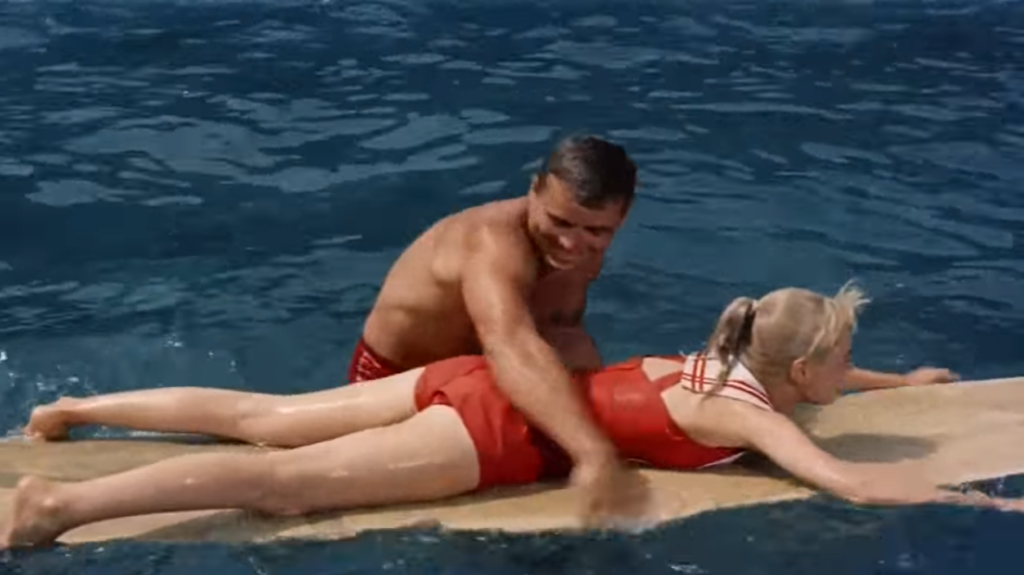
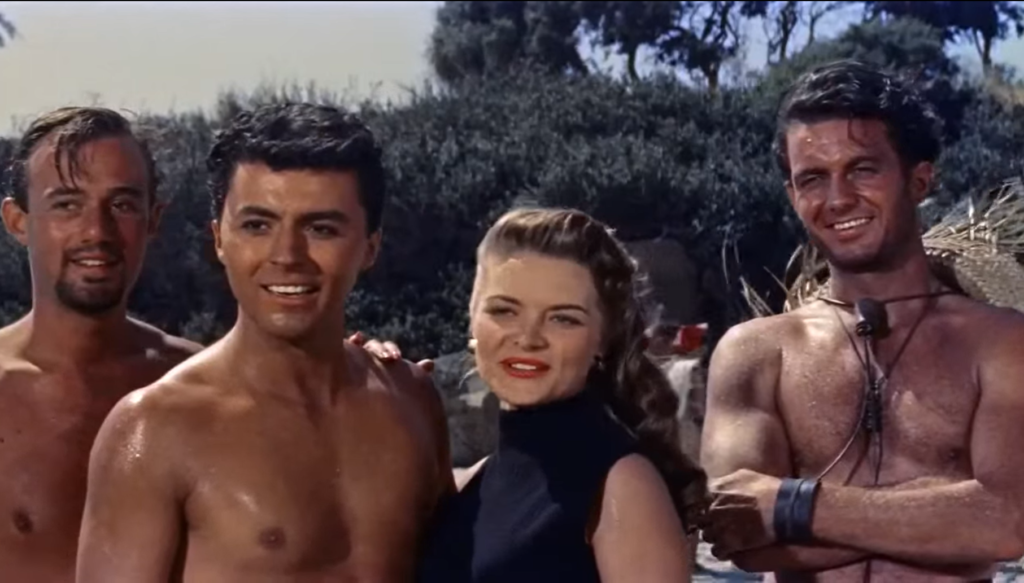
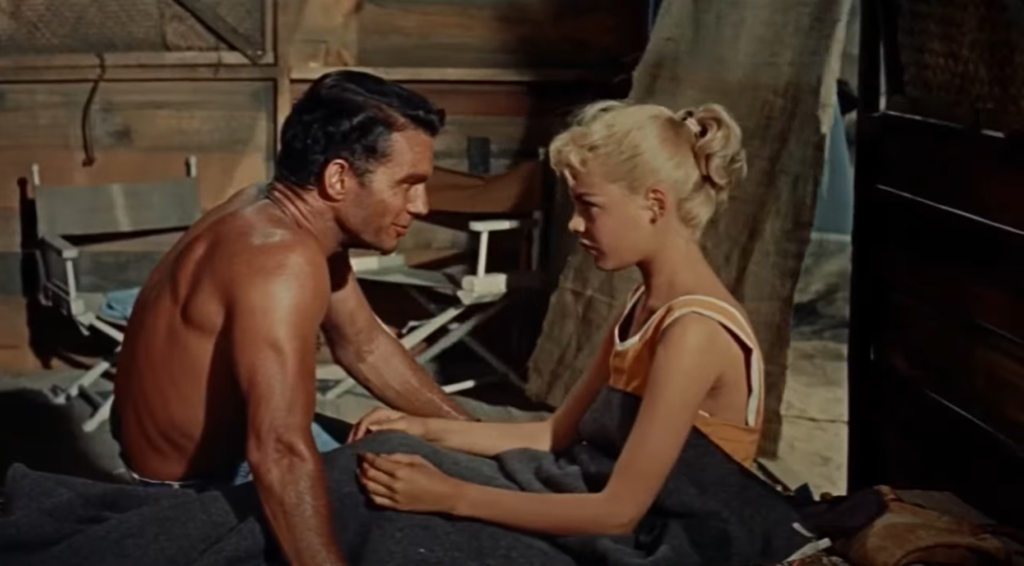
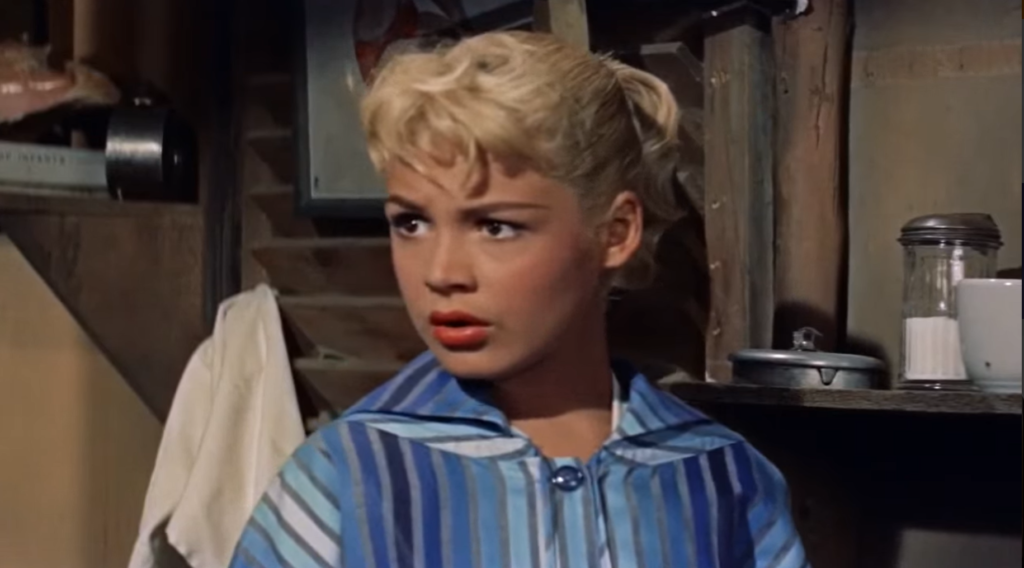
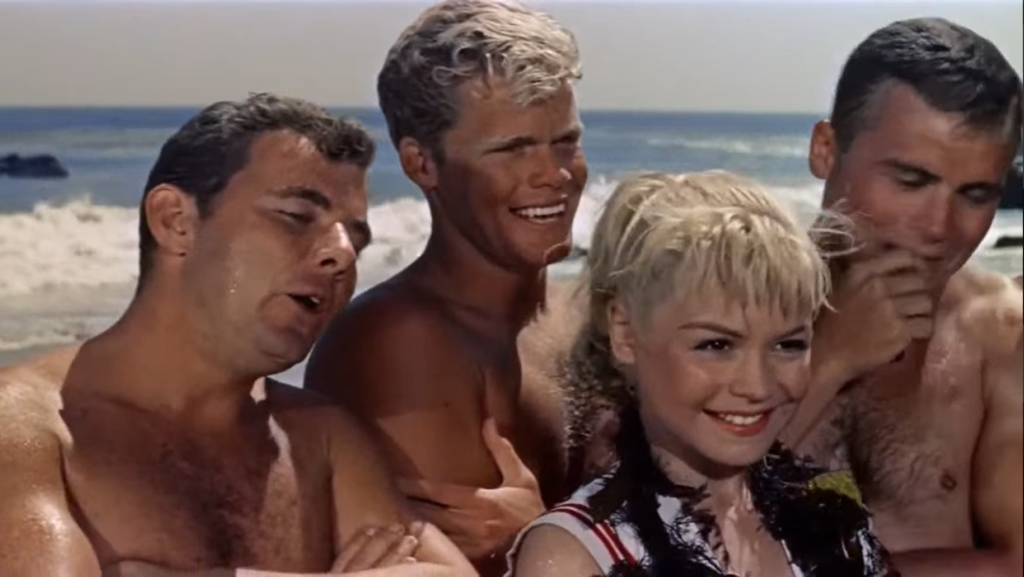
3 thoughts on “Gidget (1959)”
Not a must. Not at all. It’s kind of amusing to think that this was based on a novel. A novel??? Really???
Even though Gidget is different from the rest of the girl gang, we find out early on – through one of her friends – what the mind-set is here: “OK, so you’re an A-student – that’s ‘parent stuff’! You know anybody else it impresses?”
OK, so we’re with ‘the fun set’.
And girl badly wants to meet boy. Mom isn’t much help: “One of the advantages of being a young lady is it’s not up to you, it’s up to the young man.” ~to what?, club you over the head and drag you home to the kitchen?
Speaking of clubs, mom continues to toss pearls of wisdom when Gidget asks her point blank when she’ll know what true love is: “When it’s the real thing, you’ll know it..as surely as if you’d been hit on the head with a sledgehammer.” Really? I always thought that was hormone overdrive. Besides, has the “You’ll know” theory, in general, ever been known to work in practice, without the test of time?
It could be just me but I find Gidget to be something of a whiner when she doesn’t get her way. She pouts, she cries, she begs mommy to make daddy ‘see reason’. OK, so she’s not a “manhunter” like her friends. She’s more of a classic tomboy, only a bit more girlish. But she still practices “Make the one you want jealous.” To me, a bit tiresome.
‘Gidget’ is filmed in a flat, “Well, let’s put the camera here in front, where they’re talking” way. Like tv, not cinema. And dig those crazy rear projections during the surfing scenes! Paul Wendkos directed this, followed mostly by work in tv, of course – except for some odd, semi-‘humorous’ films such as ‘Angel Baby’ and ‘The Mephisto Waltz’.
Not much going on here. Not even for its place in cinema history.
Note for cult film fanatics: ten years later, Darren would turn in a surprisingly against-type performance in Jesus Franco’s ‘Venus in Furs’: a bonkers flick, but definitely worth a look!
Maybe (for me) this is one of those “personal recommendations” Peary so generously sprinkles throughout his own book — a film that resonates for me on some personal level, and will perhaps be more (potentially) meaningful for females than males.
Not that I was ever into surfing — but I could certainly relate to Gidget’s feelings of anxiety over not fitting in with her peers, and her desire to do something OTHER than simply sit around looking/dressing sexy for guys.
The novel this movie is based on, as I recall (I read it as a teen), is not at all a bad read, and quite a cultural relic. It’s recommended (by me, anyway) too.
I’ll agree that the filming style isn’t particularly noteworthy; this one is about the narrative and (certain) characters, not the presentation. Yes, the surfing scenes with obvious backdrops are corny, but I just find that amusing, as part of this film’s historical interest — given how mercilessly this type of scene was skewered by others (notably Charles Busch in “Psycho Beach Party”).
I almost made mention of how ‘Gidget’, for reasons you state, could very well have a somewhat ‘secret code’ in it for females other than males. I’m willing to concede that (and the dialogue among the girls did not go unnoticed). It would be nice if that aspect were illuminated more for a general audience – but the film *is* a product of its time, and its time still had very rigid codes about male-female relations. That seemed the emphasis.
I’m also willing to concede that the book was different from the film. I hope so.
I’m not a fan of ‘Psycho Beach Party’, however. Aside from Lauren Ambrose’s fearless work in the lead, I found the film to be a major missed opportunity. Busch’s work is, for the most part, totally surface – as if the word ‘homage’ is supposed to suffice, with a smidgen of extra effort.